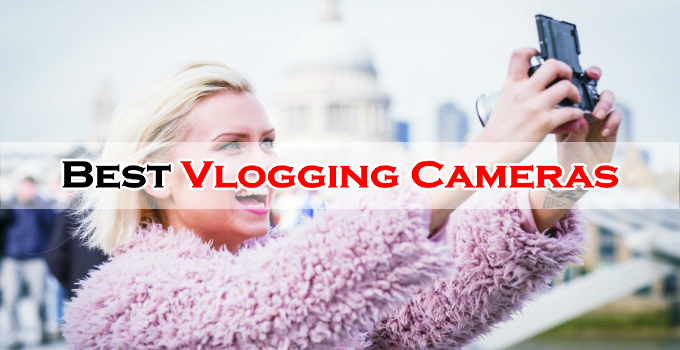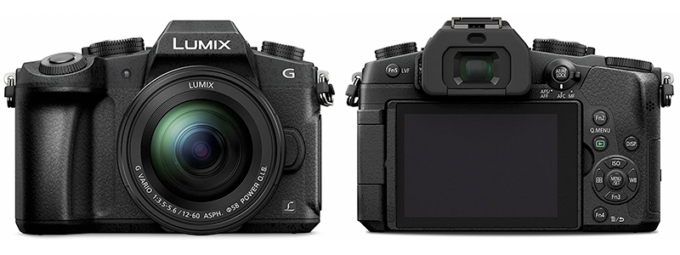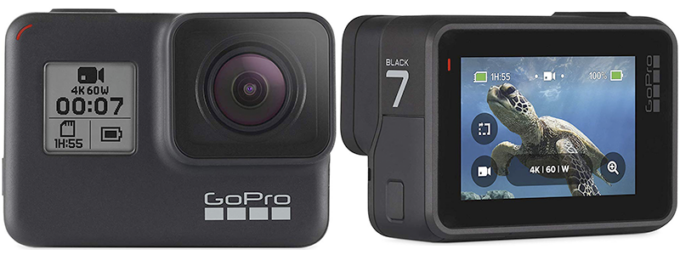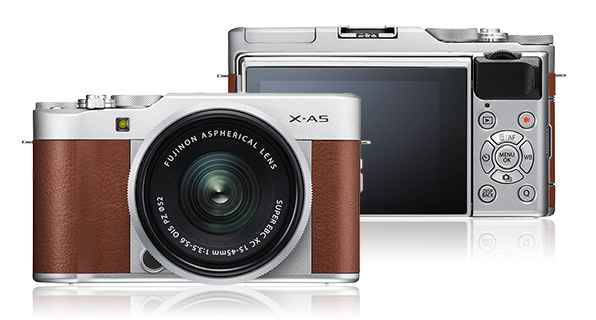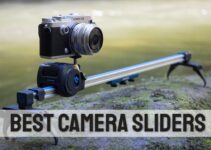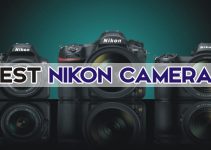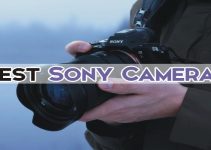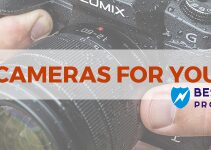Vlogging has gone from something people did for fun to a full-time profession for some. When there are a million different ways by which you may vlog now, you won’t get much without the best vlogging camera.
Unfortunately, selecting the most appropriate one can be extremely difficult when you’re just beginning. Bearing that in mind, here are a few areas you will want to hone in on.
How to Choose the Best Vlogging Camera
What’s the style of Your Own Vlog? Whether you currently have a busy audience or are only beginning, you have to consider your style first and foremost. A vlogger that focuses on tech or tutorials will want a camera capable of shooting clear, steady streams.
On the flipside, someone who does a travel site or is into action sports may need a completely different camera. What works for one, may not work for another so keep your needs in mind — particularly if you’re a gamer.
Video Quality
If you were going to snap photographs instead of shooting video, then this is where we would discuss the size of the sensor and cover hardcore tech specs. Well, those are still significant, but the resolution is that the principal specification vloggers need to remember. Typically, these are the three resolutions you will need to know.
- HD — Whenever you find the term HD, it means 720p. In contrast, many smartphones and modern TV sets have higher resolution, so cameras in this class are ordinarily in the budget scope. Depending upon your audience, HD is definitely not a bad thing.
- FHD — Should you want to have more clarity, FHD is your very best bet. It’s a few rungs down in the highest resolution available, but 1080p is not anything to scoff at. Right now, it’s the most frequent standard about and one which has not yet been surpassed by our second alternative. You will get some of the best funding vlogging cameras in this array.
- UHD — UHD stands for”Ultra HD” otherwise called 4K. Consumers that want the very best vlogging camera and despise upgrading should go for a UHD camera. They aren’t necessarily economical in most cases, but your audience will value the uptick in sharpness and color.
Audio
Audio the other place you want to concentrate on although it is something you can update, unlike the sensor. If you sound like you are speaking with a mouth full of marbles, it’s safe to say you will lose a few audiences.
Each camera capable of movie features an integrated mic. To say the quality varies is an understatement so look at an external mic. There are dozens of alternatives available, however RODE’s lineup is a fantastic place to begin if you want a great external mic to your vlog. If you want to learn more about the fashions of microphones available, make sure you check this out.
Display
As we live in the technological age, you can discover a display on everything from a refrigerator into the dashboard of your car. Cameras are no different, and high-end versions have some fairly interesting screens. Some sit flush in the body such as a regular camera, and while they will suffice, a pop-out screen ought to be the very first feature on your want list.
When vlogging, you generally should get a look at yourself that is where this kind of display excels. It’s also an area in which you want to pay close attention as the method by which the display pivots and swivels makes a huge difference.
Think about the style of movies you plan to shoot until you fall in love with a touchscreen display. The type of weapon used is essential also, especially if you’re working outdoors in direct sunshine.
Frame Rate
Instead of talking about the sensor dimensions, we are likely to talk about frame rate; a term gamers will be very familiar with. The frame rate is quantified in FPS that stands for frames per second, instead of first-person shooter now around. That said, it’s something to consider as seriously if you’d like the best vlogging camera.
We’re not going to go too in-depth here. Higher frame rates are great, but 60fps could be overkill for the YouTube tutorial. For a more”dramatic” effect, you are going to need a lower frame rate someplace along the lines of 24fps. High-speed action requires a higher frame rate, although the many people stick to 30fps as it is the most commonly accepted standard.
For customers that have to shoot sports or take a great deal of high motion shots, 60fps is the only thing to do. A great vlogging camera will provide you a wide range of options to choose from while others will stick you at one end of the spectrum. If you’re unsure of the design you plan to shoot in; this will definitely steer you in the perfect direction.
Bells, Whistles, and Battery Life
From the camera world, extra features can considerably raise the price so that it’s an area where you’ll want to go with care. Consider your needs before those extra bells & whistles rather than everybody asks a touchscreen display, however there are a couple of things serious vloggers should not be without.
The very first handy extra you’ll want to search for is Wi-Fi. It’s common on luxury cameras but hit or miss in the mid-range. We don’t have to spell out why it is crucial, and NFC along with Bluetooth are two other popular options. Arguably more important than connectivity is some thing named OIS.
Outputs should not be overlooked either believing you can’t use an external microphone without one. Battery life is crucial as is the memory, both external and internal. The latter can occasionally change, but each camera employs the SD standard.
Unfortunately, it is hard to gauge battery life as it is dependent upon the quality and length of the video you shoot. Regardless, keep recording times in mind and a good deal of all SD cards at the ready.
Best Vlogging Cameras To Buy
Vlogging is a large business for a number of people and a hobby for others. Regardless of where you stand, if you want people to listen in, you’ll need more than a fantastic personality. A great script will help although you will not get much without the best vlogging camera. Whether you’re looking for the very best mirrorless camera for vlogging or something a bit simpler, we have you covered.
1. Panasonic Lumix G85
The Best Camera for Vlogging Overall
Looking for a high-end camera that could handle the rigors of life on the road? The Panasonic Lumix G85 matches that bill using a weatherproof housing while delivering clarity thanks to its own 4K capabilities. It’s in the Pro class, also worth a look if you’re in the marketplace for the best vlogging camera for Twitch or the great outdoors.
4K is the wave of the future and also a great choice when you need clarity in your videos. The Lumix G85 can shoot 4K at 24 or 30fps or do 1080 in a full 60fps. It’s smaller than a traditional DSLR cameradue to this design, which also appears to be weatherproof. The components are no match for this Pro degree camera.
Should you need excellent sound, you will be very excited to know the G85 has 2-channel Dolby Digital. While it’s great with video, it’s still a camera at heart. That means that you can anticipate solid snapshots in the 16MP sensor and the double optical picture integration system.
The Panasonic Lumix G85 is available in three distinct bundles including one sans the lens and also surely an option for the best 4K vlogging camera.
2. Canon PowerShot G7 X Mark II
A Powerful FHD Camera
Canon is known for making quality cameras, and the PowerShot G7X Mark II is no exception. In the swiveling touchscreen display to the connectivity alternatives, it is an ideal selection for new and experienced vloggers alike.
The G7 X Mark II is a”attached” camera with Wi-Fi and NFC which allows you to post vlogs quickly. Speed is a common theme with this device as a result of the nimble DIGIC 7 picture chip and its ability to snap photographs at 8fps in several modes. As for the video, it can only handle 1080p, but it can shoot at a full 60 frames per second finish with stereo sound.
Another perk is the ability to record straight into the MP4 format. It’s widely accepted throughout the board whether you prefer a camera for YouTube or even Twitch streaming. Other tech specs for your Canon Powershot G7 X Mark II comprise a 20.1MP CMOS sensor, Intelligent IS, an HDMI port and a tilting touchscreen display. Obviously, it checks all the ideal boxes if you’re looking for an outstanding vlogging camera.
3. Olympus TG-5
A Rugged and Reliable Option
Olympus has a camera for everybody. Whereas the OM-DE M10 Mark II is a fantastic all-around snapper, the TG-5 is built for the outdoors. It could withstand harsh conditions easily and is undoubtedly the toughest vlogging camera around.
The Olympus TG-5 can snap 4K photographs and record video like most of the very best vlogging cameras. What makes it different is that the build quality along with the fact you can you can take 4K videos submerged. That’s remarkable, and so are the tech specs with 120fps high-speed video in FHD and 4K period lapse. Additionally, it has a”crushproof” evaluation and is sealed from dust, grit, and grime.
This camera can take almost anything Mother Nature throws its way and can be decked out with GPS, Wi-Fi, and a temperature sensor. The Olympus TG-5 is available in Black or Red and may be purchased alone or with a Neoprene Difficult instance.
4. Canon EOS 77D
Another Hit from Canon
This camera from Canon comes out of their popular EOS lineup and is available in several configurations. Lenses aside, the EOS 77D will offer your videos some pizazz with killer features like HDR and digital image stabilization geared towards pictures.
This camera includes a little bit of everything under the hood which makes it perfect for vloggers of varying styles. You can take time-lapse pictures or add vibrant colors to your own films and photos through HDR. Worried about stability? Do not be as this infant has Movie Electronic IS6 that could help even the shakiest of hands. You could even connect to virtually anything thinking of the 77D includes Wi-Fi, Bluetooth, and NFC.
The Canon EOS 77D is an outstanding selection for consumers just getting their vlog started or grizzled players that have streamed for years. While it maxes out at 1080p in the movie department, the inclusion of HDR makes a difference, and the 24.2MP sensor won’t let you don’t when it’s picture time.
5. Sony RX100 VI
Best Compact Camera for Vlogging
Sony pulled out all the stops with the RX100 VI, a compact camera with a beefy 20.1MP stacked CMOS sensor. It may take beautiful images in an assortment of conditions, of this there is not any doubt. When it comes to video, we’re pleased to say it’s on top of the food chain as well.
There’s quite a lot of tech under the hood of this compact camera. It is a 4K camera so that you can take Hi-Res movie at 30fps or switch to FHD for movies at a full 60fps. In 4K mode, there is no pixel binning as a result of the big Exmor RS CMOS detector.
It is also possible to slow things down with a unique mode that allows shooting 960fps and the electronic viewfinder is a big perk as well. You will not be disappointed by the picture or video quality from the RX100 VI though the cost could give you sticker shock.
Though the Sony RX100 VI is not the best option for beginners because of the price tag, it should be in your short list should you need a professional camera to your vlogs. The base model comes with the fundamentals to get you started, and there is a Vlogger package as well with the VCT-SGR1 shooting traction.
6. GoPro HERO7
A Great Waterproof Camera for Vlogging
Planning to shoot a cool movie underwater? Apparently, you’ll require a good camera to manage it. Among the best models to cope with this kind of job is GoPro HERO7. It’s not only the very best alternative for underwater movie recording but also a fantastic money-saving decision as its price certainly will not ward off you.
GoPro HERO7 is a waterproof digital camera with a sturdy rugged body which can take shots and videos at a depth of up to 33ft (10m). Owing to its hyper smooth movie stabilization, you’ll get not just bright but also sharp and comprehensive records for your vlog. Note that this camera supports 4K video style and has a choice of time-lapse movie recording.
Furthermore, you can instantly share your movies with friends in social networking since GoPro HERO7 provides live streaming. You can also store your streamed videos to a SD card at high resolution.
Another function you will appreciate is a slow-motion mode with which you’ll be able to slow down things by around 8x at an ultra-high 1080p240 frame speed. GoPro HERO7 produces good 12mp images as it includes local tone mappings in addition to noise reduction.
7. Olympus OM-D E-M10 Mark II
For Vloggers that need Multiple Speeds
Good cameras for vlogging may come in many shapes and forms. Though some have an exotic look, Olympus turned back the clock for its DE M10 Mark II. The design is more reminiscent of the timeless Pentax K1000 though the tech inside is considerably more sophisticated.
The highlight of the Olympus OM-DE M10 Mark II would be the movie modes. A series of filters let you add a little bit of flair to your production whilst Wi-Fi makes it simple to share. If your audience has a brief attention span or you take long videos, then the CLIPS feature will come in handy also.
Whether it’s a family photo you have snapped or a quick clip for the vlog, the Olympus OM-DE M10 Mark II performs superbly. It’s not always the best vlogging camera for beginners looking that need something easy and quick, but the video and image quality is topnotch.
8. Nikon D5600
Best Camera for YouTube Vlogging
Nikon has cranked cameras out because 1948, and have obtained very the following when it comes to their DSLR lineup. The Nikon D5600 is an update to the popular D5500 and falls into the mid-range category though it’s available in several configurations.
This camera includes a 24.2MP CMOS sensor in the DX-format and sports an EXPEED 4 for imaging processing. It can hang with the best of them when it comes to shooting snapshots, and with 60fps in 1080p, it’s no slouch in the video department . With connectivity, you can expect Wi-Fi to go along with Bluetooth and NFC.
The Nikon D5600 can take sharp video in a vast array of conditions and SnapBridge is a fantastic feature to have if you’re a photobug. On the downside, it is only an incremental update over the previous version that’s disappointing given the price. You can pick this one up from the bottom configuration, using a lens or at the Amazon Basics Starter Bundle.
9. Canon EOS R
Best Canon Camera for Professional Vloggers
Here is another fantastic camera to get vlogging. Its 35mm 30.3mp full-frame CMOS detector comes with DIGIC 8 image processor and its own EVF has 3.69 million dots. Thus, all of the images produced by this camera are both smooth and clear.
Add to this dual pixel CMOS AF using 5,655 manually selectable AF points in addition to AF rate of 0.05 sec and you’ll get one of the greatest Canon cameras of nowadays. Because of its video options, Canon EOS R supports both the 4K30 video recording and complete HD 1080 mode.
As there are 3 optional mount adapters that this Canon camera can be used with any EF/EF-S lenses. EOS R has a long battery life and an adjustable multi-function pub. Additionally, it supports Wi-Fi, which means that you can use it to share photos and videos.
A varied angle touch display makes this camera easy in use. Besides, it’s pretty light, so that you won’t get tired after maintaining it in control for a long time period.
10. Fujifilm X-A5
A small wonder for movie capture
Wonderfully compact, this mirrorless system camera system is just 40mm profound, and remains very slender when fitted with the optional 15-45mm kit lens, which has a retractable design and also a power zoom facility, ideal for video capture.
Great for placing yourself in the photo, the LCD screen flips up via a complete 180 degrees, automatically triggering eye-detection autofocus at the process. The simple fact that it’s a touchscreen also helps with literally pointing out moving subjects on which you would like to concentrate.
Advanced video features comprise’high-speed pictures’ with slow-motion playback, and 4K ultra-high-definition capture. There’s a catch, but in that 4K films have a maximum frame rate of only 15fps. The outcome can be very detailed but jerky video, slightly beating the item.
- Sensor: 24.2MP APS-C CMOS
- Lens mount: Fujifilm X-mount
- Screen: 3.0-inch tilt-angle touchscreen, 1,040,000 dots
- Burst shooting: 6fps
- Autofocus: 91-point AF
- Video: 4K
- Connectivity: Wi-Fi and Bluetooth
- Battery life: 450 shots
- Weight: 361g
11. DJI Osmo Pocket
A pocketable DJI gimbal that records 4K video
Now however, DJI is bringing this tech to a much wider audience with the initiation of the Osmo Pocket. The DJI Osmo Pocket is a compact three-axis stabilized camera that’s been made to help users capture creative videos and photos in a mobile form element.
The Osmo Pocket features a 1/2.3-inch sensor that is capable of recording 12MP still pictures and 4K video footage up to 60fps in 100Mbps. You will find built-in dual microphones that use innovative noise-canceling algorithms, while you are able to connect your iPhone of Android apparatus if you’d like a larger screen than the 1.0-inch touchscreen.
The DJI Osmo Pocket puts video stabilization in the palm of your hands, using a little camera that smooths your footage out thanks to a 3-axis gimbal. It’s pocketable, such as its name implies, and does not hog your smartphonelike the bigger DJI Osmo Mobile 2.
The fluid 4K resolution is excellent for anybody who uploads to YouTube, nevertheless hates the notion of being shackled to professional-sized camera stabilization equipment. It’s not quite as durable as a GoPro and its mic is not the best, but our testing proved that it’s the actual’hero’ of video and video transfer speeds.
If you are in need of a camera slider for your new vlogging adventure, check out our latest article here.

